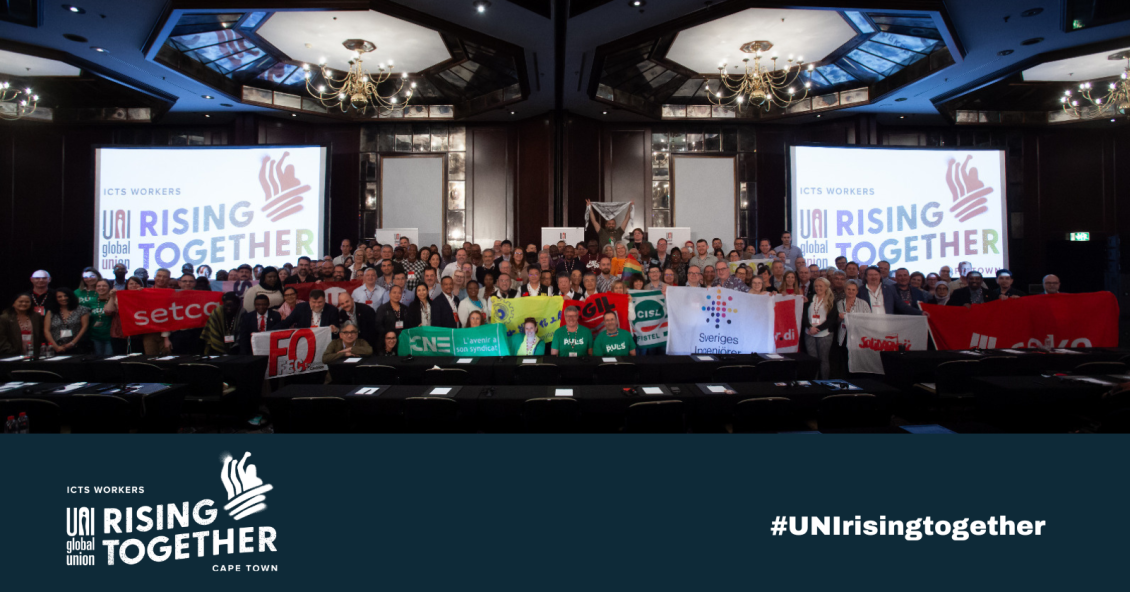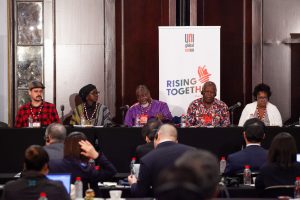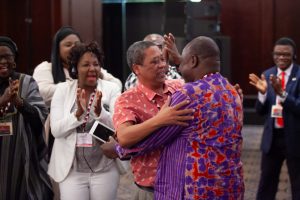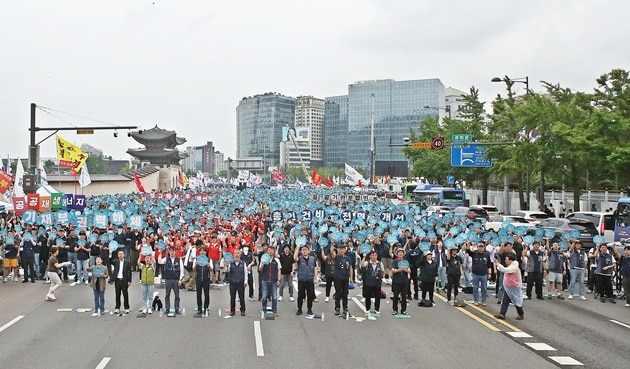Building worker power, demanding decent work in the digital age: UNI ICTS sets its course for the next four years
17.04.24
Day two of the UNI Global Union ICTS world conference set the sector’s course for the next four years. Delegates, representing ICTS workers from 95 countries, elected new leadership and adopted a strategic action plan to serve as a road map building workers’ power in telecoms, tech, video gaming and business services.
The day started with Brother Kyoichi Ando, the President of the ICTJ and the ICTS sector in UNI’s Asia & Pacific region, introducing a session focused on the transformation in the sector due to emerging technologies and the corresponding evolution of workforce skills.
Brother Ando introduced the International Telecommunication Union’s (ITU) Fred Werner for a keynote that highlighted the ITU’s role in coordinating global telecommunications and the organization’s involvement in AI standards, which directly affect the workforce. Werner explained how the ITU, along with 40 UNI agencies, launched AI for Good to develop concrete ways we can use AI to advance the United Nations Sustainable Development Goals.
Following Werner’s talk, Johannes Hofmeister of GPA in Austria spoke on the collaborative efforts in European Telecommunications Network Operators’ Association (ETNO) to implement new technologies in the telecom sector. His discussion emphasized initiatives aimed at reducing the sector’s carbon footprint and enhancing sustainability.
President of UNI Africa ICTS So Soulemane led the next panel discussion, which focused ICT unions’ role in making work safe.
Rose-Marie Diouf and Nene Koita, from the SNTPT and SYTS unions in Senegal, detailed how their unions implemented the Orange global agreement on health and safety during the COVID-19 pandemic. This agreement, first established over a decade ago, enabled workers to be a central part of the decision-making process on pandemic-related challenges and ensuring safety through health and safety committees across Orange’s operations.
The session proceeded to explore challenges in different segments of the sector. Antoine Dieulesaint from France’s STJV discussed the “crunch time” in video game development—a period of intense work pressure with significant health implications such as stress and burnout.
“There is no management of the consequences for the workers: the bosses assume that people will leave the studios after production and therefore do not need to deal with the long-term consequences. Workers are considered disposable,” he said. Video game workers across France – and the world – are organizing to make the industry one that values workers and respects their rights.
Benson Okwaro from COWU in Kenya highlighted the mental health risks faced by content moderators, who are exposed to some of the most extreme, horrific content imaginable. They are also on the frontlines of removing disinformation from the internet. The thanks they get for this work is too often low pay and trauma. COWU is helping these workers organize in Kenya, and with support from the Ford Foundation, is leading the charge in establishing international health and safety standards.
Patricia Nyman, from South Africa’s SACCAWU and UNI Africa Women’s President, concluded the session by addressing the issue of third-party violence, particularly its impact on women. This violence, perpetrated by clients or customers, includes harassment and physical threats, which necessitate comprehensive workplace guidelines and strong union actions to mitigate.
After these inspiring examples of unions taking action, conference participants debated and approved the sectors five-pronged strategic plan for 2024-2028.
- Building Union Power in Key ICTS Multinational and Regional Companies – So Soulemane took the stage again to introduce this motion organizing workers in multinational companies, enhancing the application of human rights within these corporations, and supporting unions through technological and structural changes in telecommunications. The strategy includes organizing campaigns and using global agreements and human rights due diligence to protect workers’ rights, especially in outsourcing scenarios.
- Rising together to organize and raising standards in business services – Maricarmen Llamas, from Mexico’s STRM and UNI Americas ICTS President, highlighted efforts to improve conditions in business services, including in contact centres and content moderation. The plan is to broaden work areas, implement the Teleperformance global agreement, and set industry standards, particularly for online platform safety and content moderation.
- Rising Together in Global Tech and Game Companies – Presented by Andy Kerr, the outgoing UNI ICTS World President via video, this part of the strategic plan aims to make UNI a hub for tech and games workers and to support their organizing and collective bargaining at major tech companies. Strategies include engaging in visibility activities, providing organizing and bargaining training, and developing trade union alliances.
- Building Political Influence and Economic Power for ICTS Workers – Syndicom’s Hügli discussed the need to promote dignified work, good pay and conditions, and advocate for human rights and ILO standards. The plan calls for engagement with elected leaders, regulators and social dialogue mechanisms to make sure that workers concerns are represented when policies are made.
- Building a Strategy for Decent Work in a Digital Age – Presented by Bro. Ando, the focus was on mitigating the adverse effects of AI and new work organization and promoting skills development to adapt to industry changes. Actions include promoting collective bargaining, maintaining a database on remote work practices, and advocating for continuous skills development through global agreements.
Conference participants then adopted a series of motions – including an emergency motion demanding an end to excessive layoffs in tech and gaming – as well as elected new leadership.
So Soulemane was elected the new UNI ICTS World President, marking the first presidency from the African continent since the sector’s inception in 2011.
“We know the magnitude of the tasks that lie ahead. But we know this is a task that we will be carrying forward with UNI Africa’s support and all other regions’ support,” he said in an emotional speech.
Andy Kerr, the outgoing president, delivered a moving farewell speech, reflecting on the shifts in telecom and tech sectors over the past nine years of tenure. He spoke about the significant progress with major companies like Ericsson, Teleperformance, Google and Microsoft. Participants acknowledged Kerr’s immense contribution to the global trade union movement.
“Workers united will never be defeated and we should never ever forget that,” he concluded.





